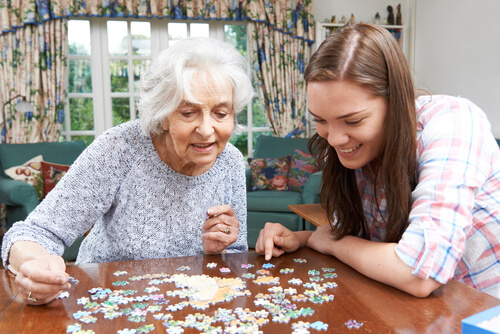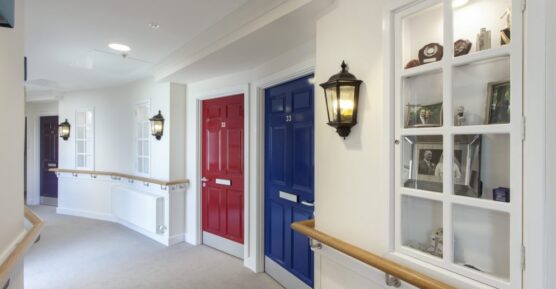
Page contents
- What is a Montessori care home?
- Who was Maria Montessori?
- How does Montessori help people with dementia?
- ‘Whether we’re 4 or 104…we all need a reason to get out of bed’
- Montessori methods: 'Positive reinforcement and repetition'
- How does Montessori help care home residents?
- Montessori care home activities
- Montessori activities trigger ‘memories and sequences’ to complete tasks
- Montessori approach: ‘The more you do, the better you get’
Page contents
- What is a Montessori care home?
- Who was Maria Montessori?
- How does Montessori help people with dementia?
- ‘Whether we’re 4 or 104…we all need a reason to get out of bed’
- Montessori methods: 'Positive reinforcement and repetition'
- How does Montessori help care home residents?
- Montessori care home activities
- Montessori activities trigger ‘memories and sequences’ to complete tasks
- Montessori approach: ‘The more you do, the better you get’
Montessori care methods are being adopted in care homes across the UK but what is a Montessori care home? This article highlights how Montessori helps with dementia and other residents living in care homes.
What is a Montessori care home?
If you live in a care home, the Montessori ethos encourages you to be as independent as possible, to have a meaningful place in your community, have high self-esteem and make real choices for yourself.
Montessori creates environments where you can do things for yourself and contribute to your home or community. It gives care home residents meaningful roles, routines and activities to help foster self-sufficiency. This is particularly helpful for people living with dementia, older people and those with disabilities.
Who was Maria Montessori?
The Montessori ethos was developed by Italian physician Dr Maria Montessori.
Maria Montessori created a learning method for letting children lead their own learning based on their interests and abilities. This allows an individual to develop at their own pace in the way they wish. This is the opposite of a ‘one size fits all’ approach.
The Maria Montessori Institute is a charity championing the Montessori approach at every stage of life. It operates schools and provides courses for anyone interested in Montessori.
How does Montessori help people with dementia?
Former nurse Anne Kelly is a Montessorian and dementia/disability consultant who has worked in dementia care for 38 years and has qualifications in post graduate dementia management.
Anne Kelly said: “I’ve had many people say to me ‘Isn’t Montessori about children? And my answer is, no it’s not, it’s the philosophy that transfers over. That same philosophy that says children need choice, meaningful engagement, a sense of high self-esteem. We need that at any age!
“Most people associate Dr Montessori’s work with a childhood education system. When discussing Montessori’s methods for ageing, disability and dementia, we’re talking about her ethos and philosophy that transfers over into aged and disability care.
‘Whether we’re 4 or 104…we all need a reason to get out of bed’
“It doesn’t matter how old or able we are, whether we’re four, 40 or 104, or whether we are deaf, in a wheelchair or have other disabilities; we all need a reason to get out of bed every day.”
When it comes to Montessori methods in care homes, people with dementia need to be able to learn to do things for themselves. It does not want adults to be treated like infants.
“People with dementia are not ‘good boys and girls’. People are adults. We have worked very, very hard…to get elderly people treated as adults and not children. This is why sometimes people in aged-care cringe at the word Montessori, because they attach it to children.”
Anne Kelly explains: “Dementia and disabilities can make people feel worthless and miserable, and home routines can so easily rob them of their independence and dignity.
“The Montessori approach can dramatically improve their well-being and enable them to do things for themselves rather than having things done for them. It empowers not only patients but carers and families too.”
Find your ideal care home
- Explore a wide range of care options and facilities
- Read independent ratings and reviews
- Connect directly with care homes to book a tour and discuss your needs
Montessori methods: ‘Positive reinforcement and repetition‘
Montessori’s aged care method is focussed on positive reinforcement and repetition to re-establish memory and recognition.
Ms Kelly refers to two types of long-term memory.
Declarative memory helps people process names, dates, facts, past events.
Procedural memory is the memory of how to do things. Procedural memory is learnt by constant repetition and includes skills and habits. This type of memory stays with someone with dementia for longer than declarative memory and can be used to help individuals relearn tasks.
This is done by the therapeutic technique of ‘spaced retrieval’ which enables people to recall how to do things for themselves with the help of lots of repetition.
Montessori care homes create activities that boost independence, self-esteem, choice and make residents feel a part of their community.
How does Montessori help care home residents?
Simple one-to-one activities in care homes can be repeated a few times a day/week and can be more effective than group care home activities. Activities should suit the resident’s personal interests, background and experience. By occupying them through tasks that are meaningful to them, care home residents can get a sense of worth and purpose.
Anne Kelly suggests care homes can:
- Match roles and activities to individual abilities and use their personal history and strengths.
- Nurture independence, social connections, friendships and a sense of purpose.
- Build confidence and self-esteem with routines.
- Provide prompts, materials and templates to support challenges such as memory loss.
Montessori care home activities
Montessori care home activities include:
- Giving residents small, practical tasks to do that they may have done in earlier life – such as planting flowers or painting– to stimulate long-term memories. Even though someone may not have the memory, they can still experience how they felt when it occurred. This will help the person to feel calmer, less anxious, and less isolated.
- Sorting, pairing and matching items. e.g. gloves, playing cards. Residents can match all diamonds, hearts, spades and clubs (remove other cards from the pack).
- Simple games like puzzles.
Care homes that have already adopted the Montessori approach have seen improvements in residents’ wellbeing.
Staff members at Foxburrow Grange care home completed online training with the Maria Montessori Institute to learn how to adopt the Montessori approach for residents.
Foxburrow Grange care home notes most of its residents “live with cognitive and/or physical impairments”.
Montessori activities trigger ‘memories and sequences’ to complete tasks
The care home’s website states Montessori “focuses on the person, not the dementia. Staff members have learnt how to make Foxburrow Grange an environment in which individuals can do as much for themselves as possible with meaningful roles, routines and activities tailored to the individual.
“A person with dementia in particular who may be losing their motor skills and other major areas of function quickly become dependent on caregivers to perform even the most basic tasks.
“Through Montessori-inspired activities that facilitate use of these skills, aging adults can maintain functionality longer and extend their independence.”
Montessori approach: ‘The more you do, the better you get’
Montessori activities at the care home often include sensory elements and can range from identifying and pairing socks to recognising a map of a country on a puzzle and putting the pieces together.
“These activities in turn stimulate parts of the brain which triggers memories and sequences to complete that task.”
With “self-correcting” activities, care home states skills can be developed “without correction from any perceived authority figure, which could trigger shame or low self-esteem”.
The care home’s Montessori wellbeing coordinator Emma Kiss said: “The more you do, the better you get”. She says this to residents to encourage them to do a little more every day.
The Merkel 3rd sector awards has recognised Emma Kiss as its 2023 Dementia Care Award Winner.
Anne Kelly, said of Foxburrow Grange care home that she was “delighted” to see the changes that have been made to the care home as a result of Montessori for dementia and ageing training.
“The biggest winners are the residents, whose lives have been changed as a result of Montessori and the dedication of team members who have made it happen.
“Changing practice and aged care culture is hard. There will always be much to do.”


